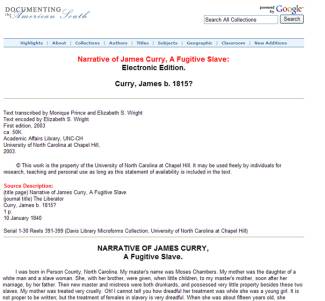Collection Name
About
This incident occurred before the Civil War, but indicates the canal was known to some of those traveling north and may have been used by others.
James Curry, excerpt from Narrative of James Curry, A Fugitive Slave, published in The Liberator,
10 January 1840
... And then I hastened on, and got as far from him as I could before morning. At Alexandria, I crossed the Potomac river, and came to Washington, where I made friends with a colored family, with whom I rested eight days. I then took the Montgomery road, but, wishing to escape Baltimore, I turned off, and it being cloudy, I lost my course, and fell back again upon the Potomac river, and travelled on the tow path of the canal from Friday night until Sunday morning, when I lay down and slept a little, and then, having no place to hide for the day, I determined to go on until I could find a place of safety.
I soon saw a man riding towards me on horse-back. As he came near, he put his eyes upon me, and I felt sure that he intended to question me. I fell to praying to God to protect me, and so begging and praying fervently, I went forward. When he met me, he stopped his horse, leaned forward and looked at me, and then, without speaking, rode on again. I still fully believe it was at first his intention to question me.
I soon entered a colored person's house on the side of the canal, where they gave me breakfast and treated me very kindly. I travelled on through Williamsport and Hagerstown, in Maryland, and, on the 19th day of July, about two hours before day, I crossed the line into Pennsylvania, with a heart full of gratitude to God, believing that I was indeed a free man, and that now, under the protection of law, there was 'none who could molest me or make me afraid.'
In the course of the morning, I was spoken to by a man, sitting at the window of a house in Chambersburg, who asked me if I wanted a job of work. I replied that I did, and he took me into his garden, and set me to work. When the job there was done, he told me I might clean his carriage. At dinner, I ate in the kitchen with a colored woman. She inquired where I came from, I told her the name of the town in Pennsylvania. Said she, 'I didn't know but you came from Virginia, or Maryland, and sometimes, some of our colored friends come from there hither, and think they are free, but the people about here are very ugly, and they take them and carry them back; and if you haven't sufficient free papers, I would advise you not to stay here to-night.'
This was enough for me. I had discovered that the man was very curious about me, and seemed disposed to keep me at work upon little jobs until night. I went out, and jumped over the garden wall, and was soon on the turnpike road. I was very fearful, and came on tremblingly; but near Philadelphia, I fell in with members of the Society of Friends, whom I never feared to trust, who 'took in the stranger,' and I worked for them until Christmas.
From Documenting the American South, at University of North Carolina at Chapel Hill. The entire document can be found on this website. Used with permission.
